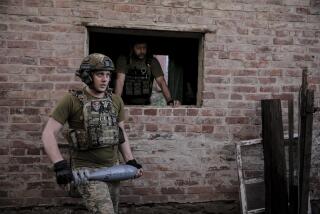Bundy Makes His Case for an Optimistic View of the World : Politics: Ex-presidential adviser is encouraged by the changes in Eastern Europe.
- Share via
As national security adviser to President John F. Kennedy, McGeorge Bundy walked with the superpowers to the brink of nuclear war during the Cuban missile crisis, then stepped back from blowing the Earth to smithereens. He has been walking from the brink ever since.
Now an optimist in a world armed with enough megatonnage to do itself in several times, Bundy says the chance of nuclear conflict today is the smallest it has been in the decades after World War II.
Bundy, whose pleasant demeanor seems at odds with his past involvement with global confrontation, is particularly heartened by the political upheavals in Eastern Europe, which have spread through the Communist Bloc like the domino theory in reverse.
“If it goes on like this, we have a good chance of ending the Cold War,” Bundy said Thursday before a visit to UC Irvine. “The basic point about Europe is that the fundamental political tendencies, both of countries and the continent, are very encouraging. It should mean less danger to any neighbor of Europe.”
Bundy came to Irvine to plead his case for optimism in U.S.-, Soviet- and European-relations during the first Julius Margolis speech sponsored by the university’s Center for Global Peace and Conflict Studies. The address, named after the center’s founder, is designed to bring a distinguished U.S. statesman to the campus every year.
At 71, Bundy, the consummate White House insider during the 1960s and early architect of U.S. involvement in Vietnam, fits the qualification.
Besides serving J.F.K., he also was national security adviser to President Lyndon Johnson, dean of the faculty of arts and sciences at Harvard University and president of the Ford Foundation for 13 years. He is now professor emeritus of history at New York University.
Since 1979, Bundy has dissected the possibilities of nuclear war and tapped the minds of those heads of state and government officials responsible for developing and maintaining the balance of terror for the last 50 years.
The upshot was the Pulitzer Prize-winning book, “Danger and Survival: Choices About the Bomb in the First Fifty Years,” published last year.
The 600-page work, which is part history book and part memoir, traces the decisions about nuclear weapons from 1941, when President Franklin D. Roosevelt first ordered a serious effort to build an atomic bomb, to 1988, when the United States and the Soviet Union agreed to limit intermediate range missiles in Europe.
Bundy is part of that history. During the Kennedy Administration, he was involved in the 1962 Cuban missile crisis, which historians have described as the pinnacle of the Cold War. After a tense standoff and a U.S. naval blockade of Cuba, Soviet leader Nikita Khrushchev agreed to remove nuclear missiles in return for a U.S. pledge not to invade the island nation.
“The chance of nuclear war has been low for a long time,” Bundy said. “But we turned a corner in the Cuban missile crisis. We learned not to get into that box again.”
Having gone from participant to observer of U.S.-Soviet relations, Bundy now believes that with the collapsing Iron Curtain, the Cold War will end soon, which ultimately could result in major reductions in nuclear arms by the superpowers.
But he said the Soviet Union, with serious economic problems, and the United States, which is now hesitant to deemphasize its military role abroad, are having the hardest time adjusting to the changes.
“There is a very strong belief on both sides that we can live with much more moderate nuclear forces,” Bundy said. “The problem is trying to decide whose weapons you are going to reduce--the fliers, the navy or the missile people. It is a set of decisions that the Bush Administration is not in a hurry to make. Somebody is going to get angry. It’s not easy to change, but the opportunity certainly is there.”
Bundy described the events in Eastern Europe as unforeseeable by the West, which has always thought reform was in the air, but something that would be slow in coming. No one, he said, could have predicted the possible reunification of East and West Germany.
He praised the Bush Administration’s handing of the reunification issue, saying the United States has kept up with German opinion, which has been “very good for a strong and mutual understanding of the Germans.”
Bundy dismissed as “pretty silly” current speculation that a new Germany will emerge again as a political and military threat to the rest of Europe and the Soviet Union.
“The country is in a peaceable mode,” he said. “They won’t have nuclear weapons because there are three other countries in their back yard that do. That means the Germans won’t start a war. Besides, they think people with nuclear weapons don’t make much sense anyway.”
Despite the developments in Eastern Europe and Mikhail Gorbachev’s attempts to reform the Soviet Union, Bundy cautions that the United States should not try to interfere with the process to avoid further tension.
“The internal problems of Gorbachev, on the whole, are getting harder not easier,” he said. “It is hard for us to do anything constructive. We can’t make those reforms. We shouldn’t joggle his elbow while he is trying.”
More to Read
Get the L.A. Times Politics newsletter
Deeply reported insights into legislation, politics and policy from Sacramento, Washington and beyond. In your inbox twice per week.
You may occasionally receive promotional content from the Los Angeles Times.











